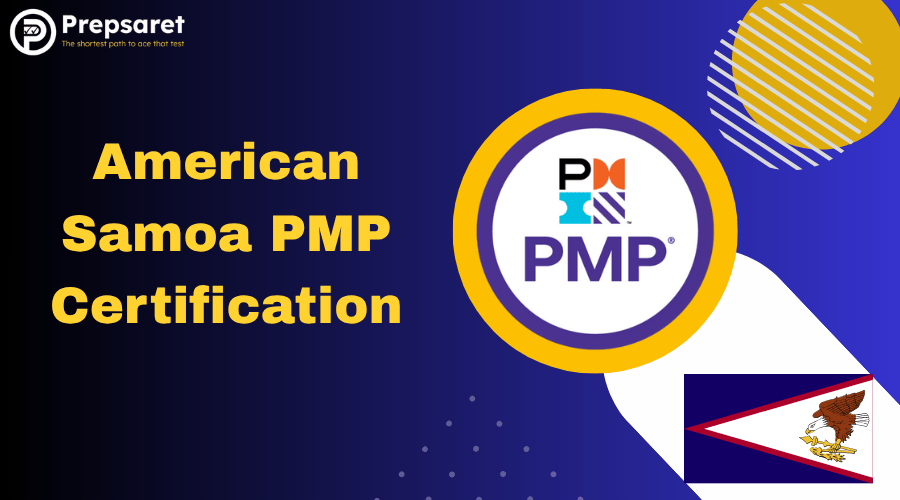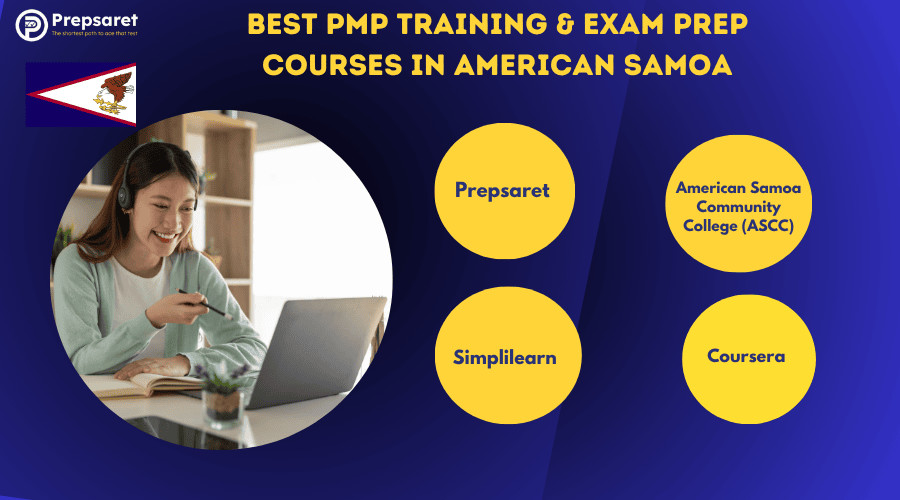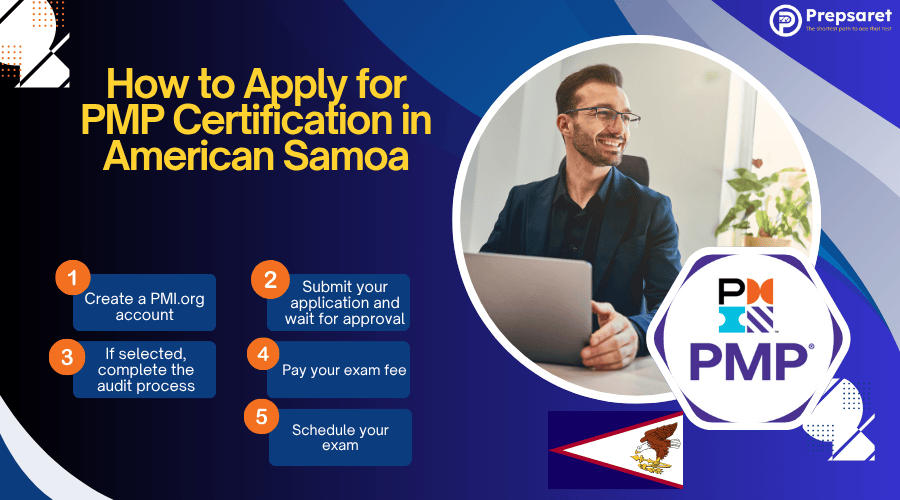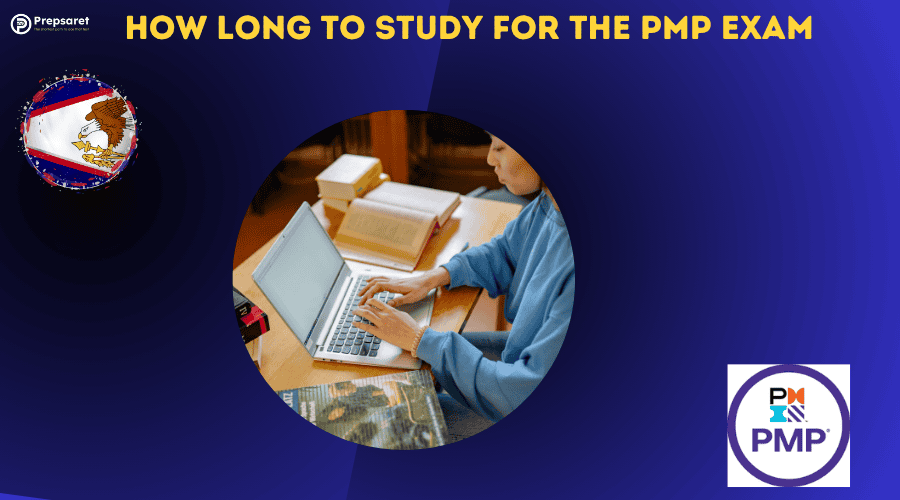Thinking about getting your PMP certification in American Samoa? Great move.
The Project Management Professional (PMP) certification is a globally recognized credential that shows the world you know how to manage projects like a pro.
It’s offered by the Project Management Institute (PMI) and opens doors to higher salaries, better jobs, and more credibility.
In American Samoa, where opportunities are growing in public service, tourism, and remote work, having your PMP helps you stand out, not just locally but worldwide.
Getting certified takes a few steps: you’ll need to meet PMP certification requirements, complete Project Management Professional training in American Samoa, apply through PMI, and pass the challenging exam.
But don’t worry. This guide will walk you through everything, training options, costs, application tips, and even what kind of jobs you can land afterward.
Ready to level up your career? Start your PMP journey in American Samoa by using Prepsaret PMP exam prep resources.
Why Get PMP Certified in American Samoa?
Living in American Samoa doesn’t mean your career opportunities have to stay small. Getting PMP certified here means you’re preparing for BIG roles in project management, whether it’s in government departments, local businesses, or remote jobs with U.S. or global companies.
Here’s what you gain:
- Better pay – PMP-certified project managers earn up to 20–25% more than non-certified peers.
- More job offers – Companies trust PMPs to lead complex projects and keep things on track.
- Worldwide credibility – Your PMP says, “I’ve got the skills to lead.”
- Work anywhere – On-island, across the U.S., or fully remote.
From infrastructure to education, American Samoa is seeing more project-based work—and PMPs are in demand to help things run smoothly. Getting your PMI certification in American Samoa could be your key to entering or advancing in these growing sectors.
Find out: Is PMP Right For You
PMP Certification Requirements in American Samoa
Before you take the plunge, let’s check if you qualify for PMP certification. PMI has three paths for PMP eligibility:
Option 1
- High school diploma or associate degree
- 5 years (60 months) of project management experience
Option 2
- Four-year bachelor’s degree
- 3 years (36 months) of project management experience
Option 3
- Master’s degree or global equivalent
- 2 years (24 months) of project management experience
PLUS: You’ll need 35 contact hours of formal project management education (or a CAPM certification). This can be fulfilled through an online PMP training in American Samoa or in-person classes.
Make sure to carefully document your experience and training when applying. PMI checks your details—and you could be selected for an audit.
Pro tip: Keep track of your projects, job roles, and responsibilities now to make the application smoother later.
Read on: PMP Exam Requirements
Best PMP Training & Exam Prep Courses in American Samoa
Before you ace the PMP exam, you’ll need to prep like a pro. Luckily, there are great PMP course options for folks in American Samoa.
In-Person Training Providers
While in-person PMP classes are limited on the islands, check with:
- American Samoa Community College (ASCC)
- Local government workforce development programs
- Regional partnerships with U.S.-based universities
Benefits of in-person learning:
- Ask questions on the spot
- Connect with other learners
- Practice in real-time with instructors
Keep an eye out for workshops or PMP bootcamps in American Samoa that may pop up throughout the year.
Online PMP Courses
If you want flexibility, online PMP training in American Samoa is your best friend.
Here are top-rated platforms trusted by thousands:
- Prepsaret – Affordable, self-paced, tons of practice exams
- Coursera – Taught by real university instructors
- PMTraining – PMP-specific, aligned with PMI’s latest exam outline
- Simplilearn – Bootcamp-style + live classes available
Most online courses include:
- Video lessons
- Downloadable study guides
- Quizzes and mock exams
- 24/7 access
Perfect for busy professionals working 9–5 (or 9–9).
Check this out: Best PMP Prep Courses
How to Apply for PMP Certification in American Samoa
Here’s how to get PMP certified in American Samoa in just 6 steps:
- Create an account on PMI.org
- Fill out the application – Add your work experience, education, and 35 hours of training
- Submit your application – PMI will review within 5 business days
- If selected, complete the audit process (upload documents, get supervisor sign-off)
- Once approved, pay your exam fee
- Schedule your exam – Choose from in-person test centers or online proctored exams (yes, you can test from American Samoa)
Tip: Start your application early so you can gather all your info without stress.
PMP Certification Cost in American Samoa
Let’s break down the typical PMP certification time and cost:
| Item | Estimated Cost |
| PMI Membership (optional) | $139/year |
| PMP Exam Fee (member) | $284 |
| PMP Exam Fee (non-member) | $575 |
| Training Course (online) | $100–$1,000 |
| Study Materials/Books | $50–$150 |
| Retake Fee (if needed) | $275–$375 |
Money-saving tips:
- Join PMI to get discounted exam fees
- Ask your employer if they offer sponsorship or reimbursement
- Use free or low-cost resources for extra practice (American Samoa PMP certification practice test options are widely available online)
Don’t forget, American Samoa PMP certification cost may vary depending on training provider and exam location.
Read on: PMP Exam Cost
PMP Exam in American Samoa: What to Expect
So, what exactly is the PMP exam like? Here’s a quick rundown:
- 180 questions
- 230 minutes to complete
- Covers 3 domains: People, Process, and Business Environment
The questions are a mix of:
- Multiple-choice
- Drag and drop
- Hotspot (clicking areas on an image)
- Matching
You can take the exam online from home or at a test center. In American Samoa, test centers are limited, so many choose the online proctored option. If you go this route, make sure you have:
- A quiet, private space
- A reliable computer and internet connection
- A government-issued photo ID
On test day, you’ll check in online or at the center, go through ID verification, and be asked to scan your room (if online). You’ll get two 10-minute breaks during the test—use them to breathe and refocus.
Tips to Pass the PMP Exam on Your First Try
Passing the PMP exam the first time is totally doable—but you need a plan. Here’s how to prep like a pro.
Develop a PMP Exam Study Strategy
First things first: make a study plan. Random cramming doesn’t work. Block out 8 to 12 weeks, and study 10–15 hours per week.
Use tools like:
- Study planners
- Progress trackers
- Milestone goals
Get Familiar with the PMBOK® Guide Seventh Edition
The PMBOK® Guide is your PMP bible. It explains the processes, terms, and best practices you’ll be tested on.
The Seventh Edition includes:
- Agile and hybrid project management
- Refined definitions and updated language
- Stronger focus on value delivery
Take Online PMP Test Prep Course
Online courses such as the one offered by Prepsaret are perfect if you like structure and expert support. Look for courses with:
- Video lessons
- Downloadable worksheets
- Practice exams
Pick a course with high student ratings and a pass guarantee to boost your confidence.
Test Your Knowledge with the PMP Practice Exam
Practice exams are your secret weapon. They help you:
- Get used to the test format
- Build test-day confidence
- Spot your weak areas
- Improve time management
Take at least 3–4 full-length American Samoa PMP certification practice tests before your real exam.
Study Using Easy-to-Understand PMP Notes
Use summary notes that break things down simply. Look for notes that:
- Cover all three domains
- Include visuals like charts or process maps
- Come with mini quizzes or flashcards
Participate in Study Groups and Discussion Forums
Join others on the same path. Try:
- LinkedIn groups
- Reddit communities
- PMI American Samoa chapter
- Online forums or Discord servers
Leverage Your 35 Contact Hours for Project Management Training Wisely
PMI requires 35 contact hours of formal training before you can take the exam. Choose a provider that’s:
- PMI-approved
- Clear about what’s covered
- Up to date with the exam content
This training builds your PMP foundation—don’t skip it.
Instructor-Led PMP Training
Prefer a classroom vibe? Go with instructor-led training. Options include live online classes or in-person PMP bootcamps in American Samoa.
It gives you:
- Live support from a certified trainer
- Real-world examples to apply the concepts
- A structured schedule to keep you on track
Continue reading: How to Pass the PMP Exam on Your First Try
After the Exam: PMP Certification Renewal in American Samoa
To keep your PMP credential active, you’ll need to complete 60 PDUs (Professional Development Units) every 3 years.
You’ll also need to pay the PMP renewal fee, which varies by membership status.
Check your dashboard on the PMI site to track your renewal progress—and don’t forget, you can easily download your PMP certificate from the PMI website once you pass.
Whether you’re starting or renewing, the Project Management Institute certification offers long-term value for project professionals in American Samoa.
How Long to Study for the PMP Exam
Most people take about 8 to 12 weeks to prep.
That’s roughly 10–15 hours per week, depending on your experience.
Suggested study materials:
- PMBOK® Guide Seventh Edition
- Flashcards
- Online prep courses
When choosing study materials, especially if you’re located in American Samoa, look for the best PMP certification programs that align with your learning style—these often include online PMP certification for American Samoa residents, which may be more accessible due to limited in-person options.
Many candidates opt for bootcamp-style PMP programs in American Samoa that offer immersive experiences and help accelerate the study process.
These bootcamps often feature live instruction, mock exams, and focused study plans to cut down prep time and maximize your retention.
Taking time to research the best PMP prep courses in American Samoa can make a huge difference in passing on your first try. Look for courses offered by accredited PMP training centers in American Samoa or trusted global providers that cater to learners in the region.
Bonus tip: Our practice exams help you cut down study time and focus on what matters most.
Learn more: How to Create a 30-Day PMP Study Plan
PMP Exam Day Preparation
Nervous? That’s normal. Here’s how to stay calm and confident:
- Breathe deep and visualize success
- Stick to your study plan the week before
- Sleep well the night before
- Eat a good meal on test day
For online exams:
- Log in 30 minutes early
- Have your ID ready
- Keep your workspace clear
For the exam, focus on:
- Memorizing ITTOs (Inputs, Tools & Techniques, Outputs)
- Knowing the 5 process groups and 10 knowledge areas
- Understanding formulas like Earned Value (EV) and Critical Path
After passing the exam, many candidates ask how to download the PMP certificate from the PMI website. It’s simple: just log into your PMI account, go to your certification dashboard, and download the official digital certificate, which you can print or share with employers.
PMP Testing Centers in American Samoa
Testing centers in American Samoa are limited or may be unavailable, so most candidates opt for the online PMP certification route. This method allows you to take the exam from home under live proctoring. Be sure to follow PMI’s guidelines to ensure your space qualifies.
For those wanting more structure, PMP bootcamp options in American Samoa offer a great way to prepare—especially for test-takers who want expert coaching in a short time frame.
When choosing your test setup:
- Make sure your space is quiet and interruption-free
- Test your tech ahead of time
- Use a wired internet connection if possible
- Pick a time when you’re most alert—morning is best for many!
Local PMI Chapters and Networking Events
While American Samoa doesn’t currently have its own PMI chapter, you can still join virtual events hosted by nearby regions or global PMI chapters. These communities are invaluable whether you’re preparing for the exam or maintaining your credential.
Why join a PMI chapter?
- Find a local or virtual mentor
- Join study groups
- Network with other professionals
- Keep learning with webinars and workshops
If you’re asking how to apply for PMP certification in American Samoa, the process is straightforward: verify that you meet the American Samoa PMP certification requirements—typically including education, experience, and 35 hours of project management training—and then apply through the official PMI website.
Make sure to enroll in training from an accredited PMP training center in American Samoa, which ensures the content meets PMI standards. These courses will help fulfill your contact hour requirement and prepare you effectively.
After earning your credential, remember to stay current with PMI’s continuing certification requirements. This includes earning PDUs, which can be done through events, courses, and webinars.
When the time comes for PMP renewal in American Samoa, staying engaged with the PMI community can make the process easier and more rewarding.
Jobs in American Samoa for PMP Certified Professionals
With a PMP certification, you’ll stand out in job markets across a wide range of industries in American Samoa, such as:
- Construction
- IT and software development
- Government agencies
- Nonprofits and international aid organizations
Common roles for PMPs include:
- Project Manager
- Program Coordinator
- PMO Analyst
- Operations Lead
The PMP certification benefits extend well beyond job titles.
PMP-certified professionals frequently earn 20–25% more than their non-certified counterparts, and the credential opens the door to remote and global opportunities—an advantage especially valuable in smaller or more isolated labor markets like American Samoa.
Additionally, understanding the cost of PMP certification in American Samoa helps with planning.
Costs typically include the application fee (around $284–$575 depending on PMI membership), prep course fees, and sometimes bootcamp expenses. Despite the investment, the long-term ROI in salary and career advancement is substantial.
Whether you’re navigating how to apply for PMP certification in American Samoa or searching for the best PMP certification programs to enroll in, it’s important to commit to the journey fully.
With smart preparation, accredited training, and the support of virtual communities, you’ll be on track to becoming a certified project management professional.
American Samoa PMP Certification FAQs
How to Verify if Someone Has a PMP Certification?
To verify if someone holds a valid PMP certification, you can use the Project Management Institute (PMI) website’s certification registry.
Enter the individual’s name or certification number to confirm their active status, ensuring the authenticity and current standing of their PMP credential.
How Much Does PMP Certification Cost?
The cost of PMP certification in 2025 includes an exam fee of $284 for PMI members and $575 for non-members, depending on the country. Additional costs may include training courses, which range from $300 to $3,000, and PMI membership fees.
Is a PMP Certificate Worth It?
A PMP certificate is widely considered worth it due to its global recognition, potential for higher salaries, and enhanced job security. It signals proven project management expertise, opens international opportunities, and is highly valued by employers in diverse industries.
Is PMP Higher Than MBA?
PMP is not higher than an MBA; they serve different purposes. An MBA is a graduate business degree covering broad management topics, while PMP is a specialized project management certification.
However, PMP is highly respected for project management roles and may complement an MBA in career advancement.
Which PMP Certification Is Most Recognized?
The most recognized PMP certification is the one awarded by the Project Management Institute (PMI), known as the Project Management Professional (PMP)®. This certification is globally acknowledged and considered the gold standard for project management professionals.




